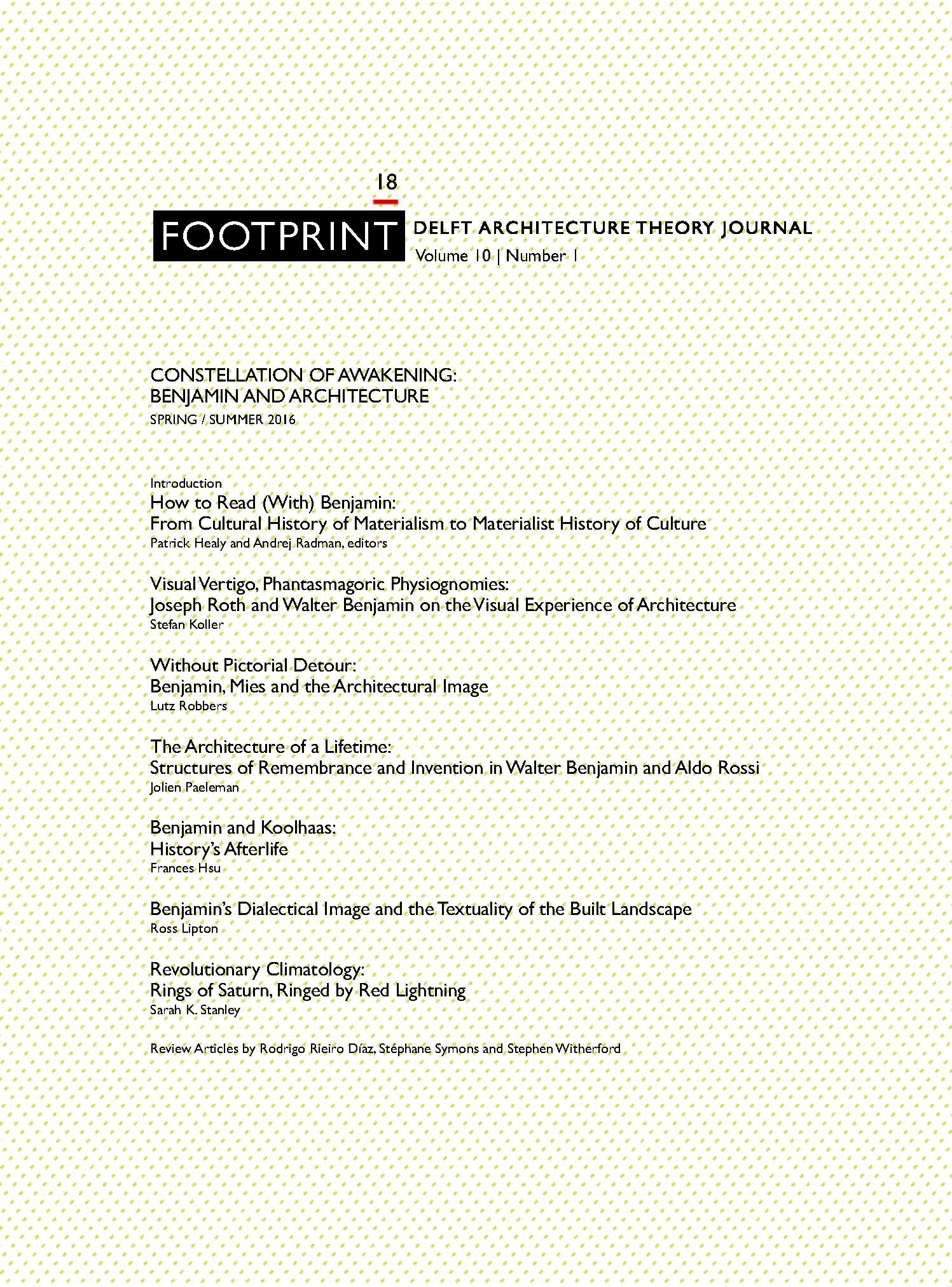How to Read (With) Benjamin: From Cultural History of Materialism to Materialist History of Culture
DOI:
https://doi.org/10.7480/footprint.10.1.1096Abstract
Footprint 18 investigates the following issues: what Benjamin understands by the ‘constellation of awakening’, how he conceptualises ‘dialectical images’, his deployment of montage, his refusal of a conception of either progress or decline, and his undertaking to show that the images belong not only to a particular time but attain legibility only at a particular time. Famously, according to Benjamin, image is that wherein what has been comes together in a flash with the now to form a constellation. With regard to the architectural theory Benjamin engaged directly with the tectonic tradition, especially the work of Bötticher. He posited the tectonic unconscious and the deployment of optical instruments as crucial for understanding the development which architecture carried from the luxus capitalist forms of commodity. In light of technical innovations in iron and glass, it expressed a form of projective dream work of the architectural around material realisations as products of the industrial revolution, with long consequences for the future.
References
Adorno, Theodor W. and Walter Benjamin, The Complete Correspondence, 1928–1940, ed. Henri Lonitz, trans. Nicholas Walker (Cambridge, MA: Harvard University Press, 2001).
Adorno, Theodor W., History and Freedom (Lectures 1964–1965), ed. Rolf Tiedemann, trans. Rodney Livingstone (Cambridge: Polity Press, 2006).
Avanessian, Armen and Suhail Malik, eds. Genealogies of Speculation: Materialism and Subjectivity Since Structuralism (London: Bloomsbury Academic, 2016).
Benjamin, Andrew and Charles Rice, eds., Walter Benjamin and the Architecture of Modernity (Melbourne: re.press, 2009).
Benjamin, Walter, ‘Le Paris du Second Empire chez Baudelaire’ in Charles Baudelaire: un poète lyrique à l’apogée du capitalism, trans. Jean Lacoste (Lausanne: Editions Payot, [1938] 1979).
Benjamin, Walter, ‘The Work of Art in the Age of Mechanical Reproducibility’, trans. Pierre Klossowski, in Zeitschrift für Sozialforschung (1936).
Benjamin, Walter, One Way Street and Other Writings, trans. E. Jephcott and K. Shorter (London: Verso, 1979).
Benjamin, Walter, Sonnets, translated and with commentary by Carl Skoggard, (New York: Publication Studio Hudson, 2014).
Benjamin, Walter, The Arcades Project, ed. Rolf Tiedemann, trans. Howard Eiland and Kevin McLaughlin (Cambridge, MA: Belknap Press/ Harvard University Press, 2002).
Blanqui, Louis Auguste, L’Éternité par les astres (Paris: Librairie Germer Baillière, 1872).
Buck-Morss, Susan, The Dialectics of Seeing: Walter Benjamin and the Arcades Project (Cambridge, MA: The MIT Press, 1989).
Cohen, Tom, ‘Trolling “Anthropos” – Or, Requiem for a Failed Prosopopeia’ in Twilight of the Anthropocene Idols, eds. Tom Cohen, Claire Colebrook, J. Hillis Miller (London: Open Humanities Press, 2016).
Crary, Jonathan, Suspensions of Perception: Attention, Spectacle, and Modern Culture (Cambridge, MA: MIT Press, 2001).
Downing, Eric, ‘Lucretius at the Camera: Ancient Atomism and Early Photographic Theory in Walter Benjamin’s Berliner Chronik’, The Germanic Review 81,1 (Winter 2006), 21-36.
Elliott, Brian, Benjamin for Architects (London and New York: Routledge, 2011).
Guattari, Pierre-Félix, The Guattari Reader, ed. Gary Genosko (Oxford: Blackwell Publishers, 1996).
Hanssen, Beatrice, ed., Walter Benjamin and The Arcades Project (London and New York: Routledge, 2006).
Hartoonian, Gevork, ed., Walter Benjamin and Architecture (London and New York: Routledge, 2010).
Herzl, Theodor, Altneuland (Leipzig: Hermann Seemann Nachfolger, 1902).
Ingram, Susan, ‘”The Task of the Translator”: Walter Benjamin’s Essay in English, a Forschungsbericht’, TTR: traduction, terminologie, rédaction, vol. 10, 2 (1997), 207–233.
Joyce, James, Dubliners (New York: Penguin Books, 1914).
Lahiji, Nadir, ed., The Missed Encounter of radical Philosophy with Architecture (London: Bloomsbury, 2014).
Massumi, Brian, ‘Surfacing (Too Late)’ in Deleuze, Guattari, and the Philosophy of Expression (Involuntary Afterword), ed. Brian Massumi (Toronto: Univ. of Toronto, 1997).
Massumi, Brian, Ontopower: War, Powers and the State of Perception (Durham and London: Duke University Press).
Meillassoux, Quentin, After Finitude: An Essay on the Necessity of Contingency, trans. Ray Brassier (London: Continuum, 2008).
Schelle, Karl Gottlob, Die Promenade als Kunstwerk (On the Art of Walking), published in German in Leipzig in 1802.
Stiegler, Bernard, What Makes Life Worth Living: On Pharmacology, trans. Daniel Ross (Cambridge: Polity Press, 2013).
Downloads
Published
Issue
Section
License
- Authors retain copyright and grant the journal right of first publication with the work simultaneously licensed under a Creative Commons Attribution License that allows others to share the work with an acknowledgement of the work's authorship and initial publication in this journal.
- Authors are able to enter into separate, additional contractual arrangements for the non-exclusive distribution of the journal's published version of the work (e.g., post it to an institutional repository or publish it in a book), with an acknowledgement of its initial publication in this journal.





